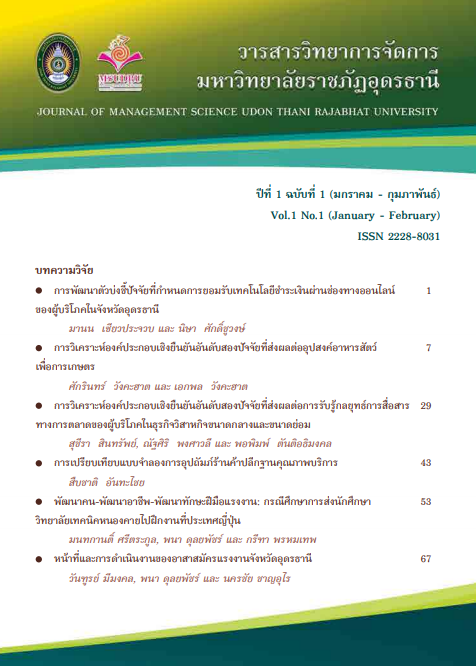HUMAN DEVELOPMENT-OCCUPATIONAL DEVELOPMENT-LABOR SKILLS DEVELOPMENT: A CASE STUDY OF SENDING NONGKHAI TECHNICAL COLLEGE STUDENTS TO RECEIVE TRAINING IN JAPAN
Main Article Content
Abstract
This study was a pilot study of sending Nongkhai Technical College students to job training in Japan and aimed to study project engagement process for sending students abroad for training and also to discover guidelines for management on sending vocational students for skills training in Japan. In addition, this pilot study aimed to learn possibility of data access and practice research skills of researchers as the preliminary findings would be applied for thesis. The researchers employed qualitative research including in-depth interviews with informants selected from purposive sampling. The informants consisted of executives of Nongkhai Technical College involved in the collaboration project, principle of Asia Japanese Language School and students participating in the project. The preliminary findings included phases, management, preparedness of vocational students participating in the project, regulations and obstacles both in country of origin (Thailand) and country of destination (Japan).
Article Details

This work is licensed under a Creative Commons Attribution-NonCommercial-NoDerivatives 4.0 International License.
บทความที่ได้รับการตีพิมพ์เป็นลิขสิทธิ์ของคณะวิทยาการจัดการ มหาวิทยาลัยราชภัฏอุดรธานี
ข้อความที่ปรากฏในบทความแต่ละเรื่องในวารสารวิชาการเล่มนี้ ไม่ใช่ความคิดเห็นและความรับผิดชอบของผู้จัดทำ บรรณาธิการ กองบรรณาธิการ และคณะวิทยาการจัดการ มหาวิทยาลัยราชภัฏอุดรธานี ความรับผิดชอบด้านเนื้อหาและการตรวจร่างบทความแต่ละเรื่องเป็นความคิดเห็นของผู้เขียนบทความแต่ละท่าน
References
กระทรวงศึกษาธิการ. (2554). นโยบายและยุทธศาสตร์การปฎิรูปการศึกษาด้านการพัฒนาอาชีวศึกษา. กรุงเทพฯ: วี. ที.ซี. คอมมิวเคชั่น.
กฤษมันต์ วัฒนาณรงค์. (2555). การพัฒนาอาชีวศึกษา สำหรับประเทศไทย. สืบค้นเมื่อวันที่ 22 มกราคม 2559, จาก http://www.thairath.co.th/content/236194.
บริษัทจัดหางานไทยอัศวเลิศ. (2558). โครงการฝึกงานญี่ปุ่นไทยอัศวเลิศ. หนองคาย: บริษัทจัดหางานไทยอัศวเลิศ.
บุญณิสา ส่งแสง. (2554). ทำไมระบบการศึกษาไทยจึงพัฒนาช้า. สืบค้นเมื่อ 19 มกราคม 2559, จาก http://school8.education.police.go.th/technical05.html.
วิจิตร ศรีสุพรรณ. (2545). การวิจัยทางการพยาบาล: หลักการและแนวปฏิบัติ. วิทยานิพนธ์พยาบาลศาสตรมหาบัณฑิต คณะพยาบาลศาสตร์ มหาวิทยาลัยเชียงใหม่.
วิทยาลัยเทคนิคหนองคาย. (2558). แผนภูมิแสดงจำนวนผู้เข้าร่วมโครงการของวิทยาลัยเทคนิค หนองคาย. สืบค้นเมื่อวันที่ 26 ธันวาคม 2558, จาก http://www.nktc.ac.th/
วิทยาลัยเทคนิคหนองคาย. (2558). ประวัติ. สืบค้นเมื่อวันที่ 20 ธันวาคม 2558, จาก http://www.nktc.ac.th/
ศุภกิจ วงศ์วิวัฒนนุกิจ.(2550). พจนานุกรมศัพท์การวิจัยและสถิติ. กรุงเทพมหานคร : จุฬาลงกรณ์มหาวิทยาลัย.
สำนักงานคณะกรรมการการอาชีวศึกษา. (2558). ศึกษาต่อสายอาชีวศึกษา (ปวช.). สืบค้นเมื่อวันที่ 22 มกราคม 2559, จาก http://www.trueplookpanya.com/.
สุภางค์ จันทวานิช. (2549). วิธีการวิจัยเชิงคุณภาพ. พิมพ์ครั้งที่ 14. กรุงเทพฯ: จุฬาลงกรณ์มหาวิทยาลัย.
สุริยา ฆ้องเสนาะ. (2558). อาชีวะก้าวไกล ไทยก้าวหน้า. สืบค้นเมื่อวันที่ 19 มกราคม 2559, จาก http://library2.parliament.go.th/giventake/nrc2557-article.html.
Glesne, C., & Peshkin, A. (1992). Becoming qualitative researchers: An introduction. White Plains, NY: Longman.
Marshall, C., & Rossman, G. B. (2011). Designing qualitative research. (5th ed). Thousand Oaks, CA: Sage Publications.
Robson,M., & Matthew, R. (1995). Qualitative in education: Soar issues for school and their Community. Bangkok: Principal Regional Office for Asia and the Pacific, UNESCO.


